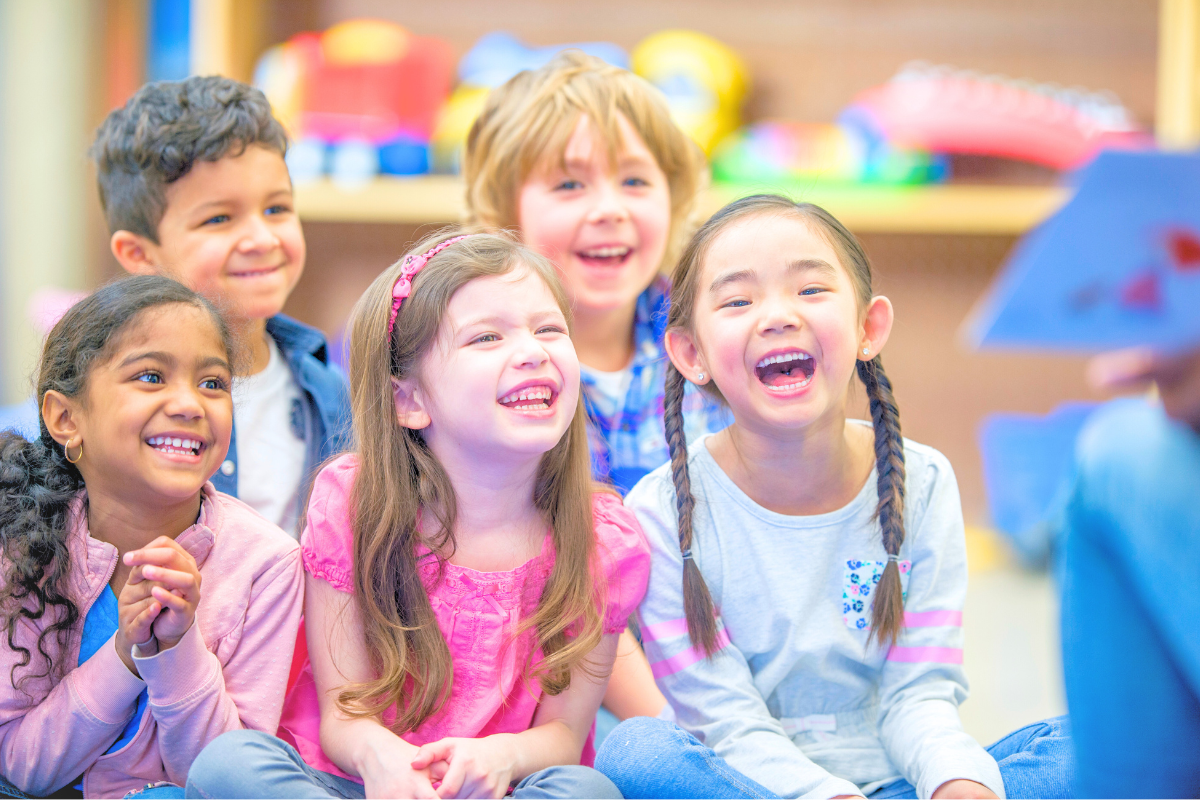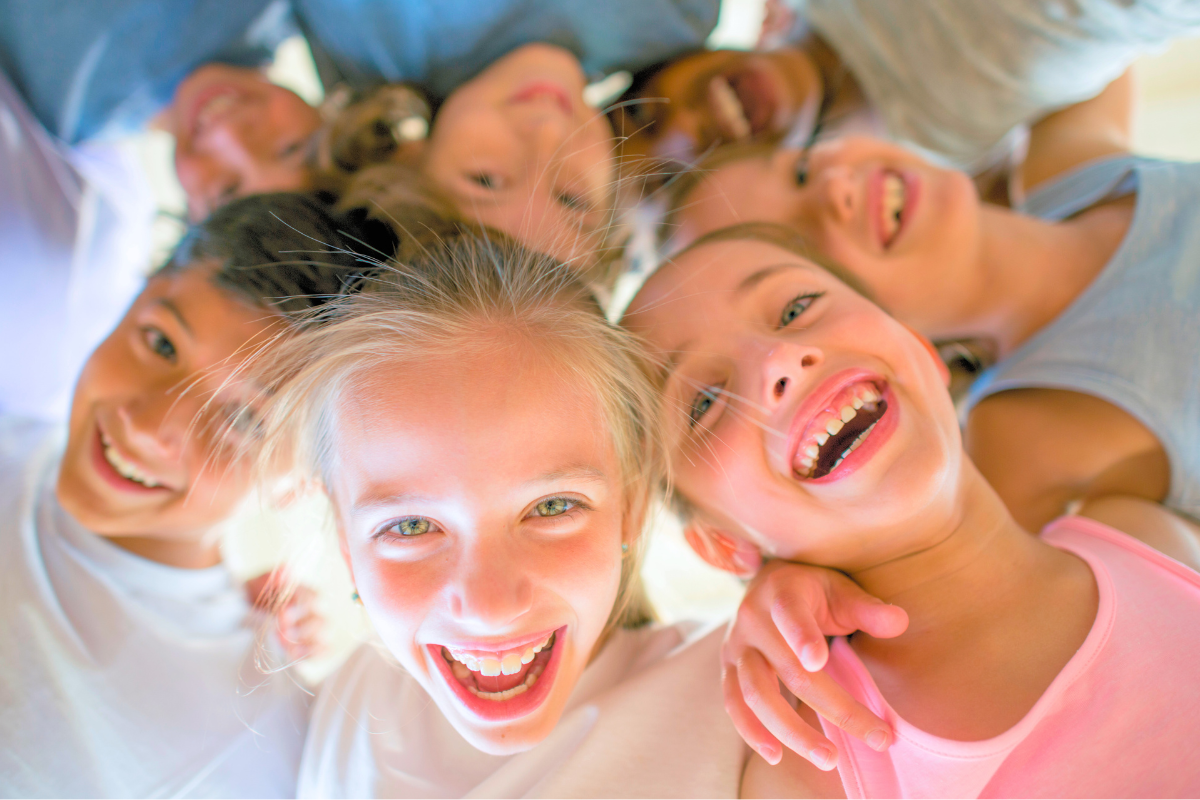Unlock the Benefits of Laughter: Why a Good Laugh Is Good Medicine
If parenting had a magic wand, it might just be laughter.
For kids and parents, a good laugh is more than a mood boost; it’s a bonding experience and a health pick-me-up rolled into one! Laughing with your little ones doesn’t just lighten the mood; it actually strengthens immune systems, relieves stress, and helps kids develop socially.
Who knew that a little giggle session could pack so much punch? Stick around to learn how sharing laughs benefits the whole family and why laughter really is a form of “good medicine”—especially when parenting gets real.
Physical Health Benefits of Laughter for Children

Laughter does more than fill the room with giggles; it supercharges your child’s health in ways you might not expect. When kids laugh, their stress response relaxes, which in turn lowers stress hormones like cortisol, and boosts immune function, and even aids heart health.
Let’s look at each of these research-backed benefits and see why laughter might be just what the doctor ordered!
-
Boosts immunity. Laughter activates your child’s immune system by increasing natural killer cell activity and antibody production. These responses help ward off infections, keeping your kids safer against the colds and bugs that seem to circle endlessly.
-
Improves heart health. Laughing helps blood vessels work better by boosting blood flow and easing stress. This natural “cardio” supports healthy blood pressure, setting up good heart habits early on. Experts even highlight that regular laughter contributes to a happier, low-stress life and lays a strong foundation for heart health as kids grow.
-
Enhances pain tolerance. Lively laughter increases pain tolerance naturally, as proven by a recent study. Giggles release endorphins, the body’s natural painkillers. Social laughter also builds resilience to discomfort, helping kids feel a bit better, faster. And laughter therapy, often included in a group exercise program or through laughter yoga, promotes resilience against physical discomfort.
-
Builds overall health. Adding a dose of laughter to each day isn’t just fun; it’s like a health boost in disguise. Those joyful moments brighten moods, ease tension, and contribute to stronger bodies. So every shared laugh, silly joke, and goofy moment is helping strengthen your child’s well-being one giggle at a time!
Making laughter a daily habit doesn’t just brighten your child’s mood—it builds their health. So the next time you share a funny moment, know that those giggles are doing more than lifting spirits; they’re strengthening the mind and body alike.
Mental Health Benefits of Laughter for Children
Laughter does wonders for kids’ mental well-being. It acts as a stress reliever and emotional booster all in one. Here’s why adding more laughter to your child’s day can lead to a healthier, happier mind!
-
Reduces stress levels. Laughter lowers stress hormones and reverses the stress response. This stress-relieving combo—cutting the stress hormone cortisol and boosting endorphins—gives kids a natural, comforting way to handle anxiety, making life’s challenges feel lighter.
-
Elevates mood. Laughter releases dopamine and serotonin, which brighten mood and lessen sadness, naturally helping kids feel more positive and confident. Laughing together, whether at a funny movie or a shared experience, creates those joyful moments that lift everyone’s spirits.
-
Encourages positive thinking. Humor helps kids approach situations with a lighter perspective, which supports positive thinking and creative problem-solving. This approach builds resilience, helping them handle frustrations and setbacks with confidence.
Adding laughter into daily life isn’t just for fun; it’s the best medicine for improved mental health that brings long-term benefits for children’s emotional health!
Social Benefits of Laughter for Children

Laughter is more than just fun—it’s a social superpower for kids. When children laugh together, they build trust, deepen friendships, and feel part of a group. These shared moments create a solid foundation for healthy social development.
In this section, let's see how laughter can make a lasting impact on kids’ social skills, communication, and confidence!
-
Strengthens social bonds. Laughter helps children connect with others, creating a sense of belonging and friendship. Studies show that shared laughter releases oxytocin, which promotes bonding. Whether it’s a playdate or family gathering, group laughter builds camaraderie and fosters a spirit of teamwork.
-
Enhances communication skills. Kids who laugh with friends often feel more comfortable expressing themselves. Laughing together reduces social anxiety and encourages open, confident communication. As children interact playfully, they learn to read social cues and improve their conversational skills, which are essential for forming lasting relationships.
-
Boosts self-esteem. Laughter helps kids feel accepted and valued in social settings. When children share funny moments, they experience a boost in confidence and feel seen and appreciated by peers. Research links positive social interactions with a better self-image, giving kids the self-assurance to face new situations and friendships with ease.
What is Laughter Yoga?
Laughter yoga is a fun and therapeutic practice that combines intentional laughter exercises with breathing techniques from yoga.
Developed in the 1990s by Dr. Madan Kataria, this practice uses simulated laughter that often turns into genuine belly laughs. The idea is that laughter, even when simulated, has genuine physical and mental health benefits.
In a typical session, participants engage in playful exercises and childlike activities that stimulate laughter, often resulting in real, spontaneous laughter.
Studies show that laughter yoga benefits mental health, such as one randomized trial with elderly depressed women. Researchers found laughter yoga participants experienced a notable boost in mood and stress relief, underscoring the practice’s potential benefits.
The benefits also include improved immune function and lowered blood pressure, making it an excellent activity for children to support both emotional and physical health.
How to Encourage More Laughter in Children's Lives
Adding more laughter to your child’s day doesn’t require elaborate plans—simple, joyful interactions can make a huge difference. Creating moments of humor, play, and connection can foster a positive environment and promote mental well-being.
Here are some practical ideas to bring on the giggles.
Play Active Games
Physical games capture children’s attention and lead to genuine belly laughs. Try hopping across a balancing beam, playing hide-and-seek on play mats, or testing out a Pikler triangle for endless, laughter-filled play.
These activities not only encourage laughter but also support motor skill development.
Plus, playing games that involve running, climbing, hopping, or balancing lets children burn off energy, making them happier and calmer later. Active play isn’t only fun; it’s a key part of physical and social development that also reinforces connections with family and friends.
Share Funny Shows and Videos
Family movie nights with kid-friendly comedies or humorous videos provide shared laughter and bonding.
Watching age-appropriate humor together gives children the space to understand different kinds of humor, which can support emotional expression and build social intelligence. Choose content that uses simple, relatable humor, creating a positive emotional atmosphere.
Organize Group Activities
Group play offers a fantastic setting for shared laughter and social growth. Organize playdates filled with laughter-focused games, like tag, hide-and-seek, or musical chairs, that encourage teamwork and communication.
Outdoor group activities, like picnics or field games, bring a sense of freedom that helps kids bond over shared fun. Group laughter helps builds friendships and also promotes empathy, as children start recognizing and responding to each other’s emotions.
Shared giggles provide a natural way for children to connect, strengthening friendships and developing essential social skills in a joyful, supportive way. Laughter-filled group play becomes a cherished experience that boosts confidence and camaraderie.
Model Laughter and Joy
Kids learn so much by watching adults. Sharing a funny story, cracking family-friendly jokes, or watching their favorite cartoon with them teaches kids that laughter is a natural part of life.
Modeling positive emotions and a playful outlook helps kids develop a joyful perspective on life. Creating an environment filled with lighthearted moments also invites children to share their own jokes, stories, and funny experiences. This joy-filled approach enriches their emotional and social world, teaching them to find humor even in simple, everyday moments.
Final Thoughts

In the busyness of daily life, laughter reminds us to pause and find joy in the little moments. Genuine laughter in your family life does more than create fun moments. It promotes a healthy, resilient mindset in kids and strengthens bonds, helping them feel safe and connected.
For parents, laughter is the best medicine for stress relief and a joyful reminder of why you started this journey in the first place. So, the next time things feel overwhelming, try to bring on the laughter. Not only will it brighten your day, but it also helps your family grow stronger, happier, and more connected—one chuckle at a time!
Frequently Asked Questions
How does laughter contribute to a child's development?
Laughter significantly enhances a child's cognitive function, emotional regulation, and creative thinking, fostering their overall mental and social growth. Embracing laughter is a joyful way to support your child's development!
How does laughter impact blood pressure compared to other relaxation techniques?
Laughter has been shown to lower blood pressure similarly to other relaxation practices like meditation and deep breathing, but it adds the extra benefits of emotional bonding and a mood boost.
How often should kids engage in laughter yoga for health benefits?
Regular laughter yoga sessions, even a few times a week, can help boost mood, lower stress, and support physical well-being in kids. As little as 10-15 minutes of laughter can promote noticeable health benefits.




